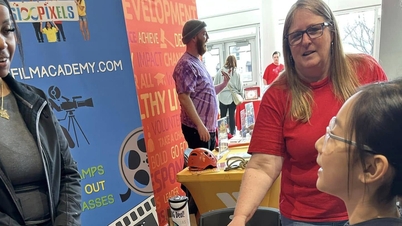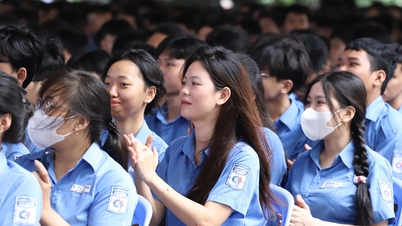
Candidates and parents learn information at the Choice Day organized by Tuoi Tre newspaper in Ho Chi Minh City - Photo: QUANG DINH
According to the Ministry of Home Affairs ' second quarter 2025 labor market bulletin, in the second quarter of 2025, the number of unemployed people increased to 1.06 million people, 25,000 people higher than the previous quarter and about 13,300 people higher than the same period in 2024.
Notably, the youth unemployment rate also increased by 0.26%, despite companies increasing recruitment.
This paradox raises many issues, including career choice among today's youth.
Choosing a "prestigious" school, ignoring strengths and passions
According to observations, when choosing a career, some students and parents currently place too much importance on income, thinking that only careers that make them rich are worth studying, so they rush into careers that are considered "hot" in the labor market, leading to demand exceeding supply.
The impact of Asian culture also causes some parents and students to have gender prejudices when choosing a career. Many young people have given up their dream of studying because they fear gender pressure during their studies, as well as the process of finding a job later.
Developmental psychologists and neuroscientists assert that occupational competence is not gender-based, but rather socially oriented.
Another prejudice is the tendency to choose prestigious schools, instead of choosing a major that suits one's strengths and passions. Many young people choose majors that are not their interests just because they want to get into a "top" school.
Using the school name as a measure of success is a misunderstanding of educational branding. This comes from the psychology of fame and the media effect of rankings of higher education institutions.
Similarly, because of the emphasis on "fame", many parents and students ignore majors with low scores even though the student's ability is suitable for that major.
In addition, the conservative notion that parents know better than their children, lack of faith in the younger generation, and fear of family traditions being lost have led many parents to force their children to follow in their family’s footsteps. As a result, many students drop out of school because they are not interested in their field of study.
The mindset of valuing degrees also makes many people not interested in vocational colleges. While developed countries value vocational training, in Vietnam, vocational training is considered by many people as a loss, a failure?!
And the harsh reality is that everyone has a university degree, but it is still difficult to find a job with a bachelor's degree, which is raising big questions about the path young people choose to enter the labor market today.
Choosing the wrong career: increasing unemployment, wasting human resources
One mistake can lead to a huge loss. Choosing the wrong major makes many students bored with studying and drop out. Not only do they lose confidence in themselves, they also find it difficult to determine their career, and when they finish school, they end up working in a different field.
From a social perspective, career prejudice leads to studying the wrong major. The result is a shortage of majors and a surplus of others, a waste of human resources, and increased unemployment even with a university degree.
Choosing a career is a personal journey that determines the course of one’s life. The future is not for those who follow preconceived notions.
We must understand ourselves clearly by frankly answering the questions: "What do you want?", "What are you good at?", "What values do you live for?" through the use of scientific career testing tools.
For example, the Holland test helps identify career groups based on interests and preferred working environments, or the MBTI test helps identify personality types and thereby choose a suitable working environment.
Or the Big Five test (OCEAN) helps to deeply assess personal psychological characteristics, while the Enneagram test helps to analyze internal motivation and personal values.
In addition to multiple choice tests, we also need to consult multi-dimensional information, listening to opinions not only from parents and teachers, but also from career consultants, alumni and people working in the industry.
It is also necessary to research the current labor market and forecast the future through industry reports or data from recruitment platforms.
And if possible, try to get real-life experience by visiting businesses, participating in work experience activities, short-term internships, or sharing sessions from industry insiders.
Families, schools, and society need to join hands to help children open the doors to future careers, and not unintentionally create invisible barriers. Parents need to accompany, listen, and respect their children's decisions, without imposing arbitrary pressure.
Teachers and schools, in addition to integrating vocational education into subjects, need to organize diverse forms of career guidance such as organizing industry tours, building a bridge for alumni forums, career guidance expert seminars, etc.
It is necessary to spread success stories in all fields, at all levels of college and university training.
Source: https://tuoitre.vn/tuyen-dung-nhieu-nhung-that-nghiep-tang-do-chon-nghe-theo-mot-nganh-giau-moi-hoc-20250728150758078.htm







![[Photo] "Ship graveyard" on Xuan Dai Bay](https://vphoto.vietnam.vn/thumb/1200x675/vietnam/resource/IMAGE/2025/11/08/1762577162805_ndo_br_tb5-jpg.webp)






























![[Video] Hue Monuments reopen to welcome visitors](https://vphoto.vietnam.vn/thumb/402x226/vietnam/resource/IMAGE/2025/11/05/1762301089171_dung01-05-43-09still013-jpg.webp)





































































Comment (0)